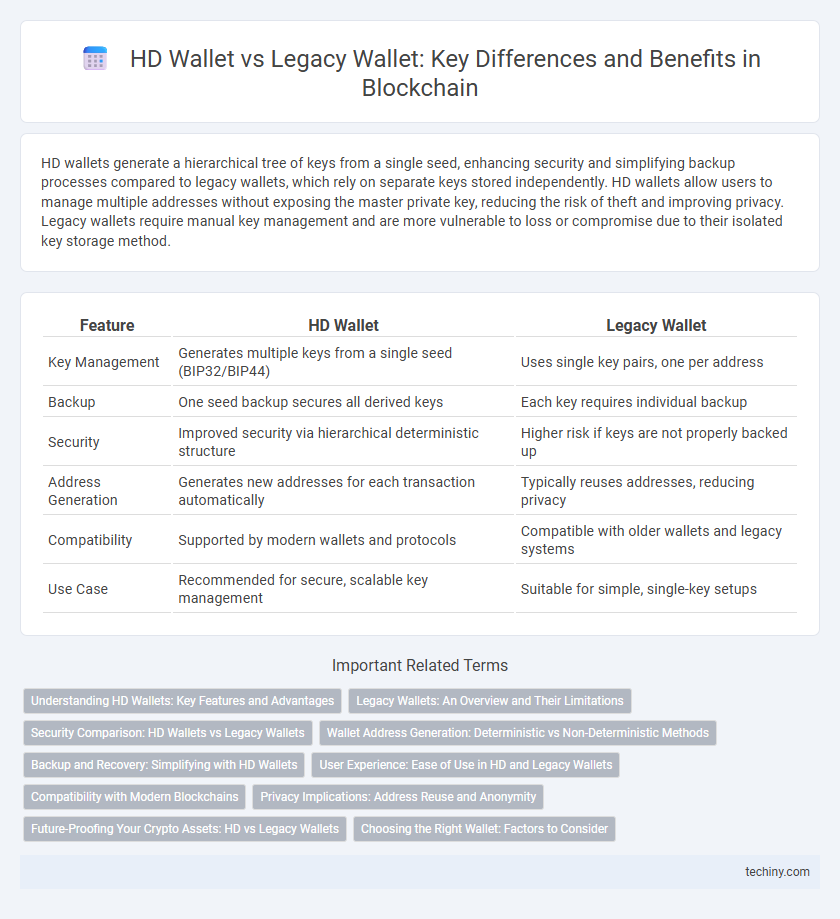HD wallets generate a hierarchical tree of keys from a single seed, enhancing security and simplifying backup processes compared to legacy wallets, which rely on separate keys stored independently. HD wallets allow users to manage multiple addresses without exposing the master private key, reducing the risk of theft and improving privacy. Legacy wallets require manual key management and are more vulnerable to loss or compromise due to their isolated key storage method.
Table of Comparison
| Feature | HD Wallet | Legacy Wallet |
|---|---|---|
| Key Management | Generates multiple keys from a single seed (BIP32/BIP44) | Uses single key pairs, one per address |
| Backup | One seed backup secures all derived keys | Each key requires individual backup |
| Security | Improved security via hierarchical deterministic structure | Higher risk if keys are not properly backed up |
| Address Generation | Generates new addresses for each transaction automatically | Typically reuses addresses, reducing privacy |
| Compatibility | Supported by modern wallets and protocols | Compatible with older wallets and legacy systems |
| Use Case | Recommended for secure, scalable key management | Suitable for simple, single-key setups |
Understanding HD Wallets: Key Features and Advantages
HD wallets generate a hierarchical tree of keys from a single seed phrase, enabling users to manage multiple addresses and private keys with enhanced convenience and security. Unlike legacy wallets that rely on a single private key, HD wallets support deterministic key generation, allowing seamless backup and recovery through a master seed. This structure improves privacy by frequently rotating addresses and reduces the risk of key loss, making HD wallets the preferred choice for long-term cryptocurrency management.
Legacy Wallets: An Overview and Their Limitations
Legacy wallets store private keys in a fixed location, lacking hierarchical deterministic (HD) features, which limits backup and recovery options. They generate the same set of addresses, increasing vulnerability to potential key exposure and privacy risks. Legacy wallets do not support automatic address generation, making transaction management less efficient compared to HD wallets.
Security Comparison: HD Wallets vs Legacy Wallets
HD wallets offer enhanced security by generating a hierarchical tree of keys from a single seed, enabling easy backup and recovery while minimizing exposure of private keys. Legacy wallets store individual private keys independently, increasing the risk of loss or theft if backups are compromised or not maintained properly. The deterministic structure of HD wallets reduces attack vectors, providing more robust defense against key compromise compared to legacy wallets.
Wallet Address Generation: Deterministic vs Non-Deterministic Methods
HD Wallets generate wallet addresses using deterministic methods based on a single seed phrase, enabling the creation of an unlimited number of addresses from one master key, enhancing security and ease of backup. Legacy Wallets rely on non-deterministic methods where each address is generated independently, making backup and address management more cumbersome. The deterministic nature of HD Wallets significantly improves address organization and recovery compared to the non-deterministic approach of Legacy Wallets.
Backup and Recovery: Simplifying with HD Wallets
HD wallets streamline backup and recovery by generating a master seed from which all private keys derive, eliminating the need to back up each key individually. This hierarchical key structure allows users to restore entire wallet contents using a single mnemonic phrase, enhancing security and convenience. In contrast, legacy wallets require separate backups for each private key, increasing the risk of loss and complicating recovery processes.
User Experience: Ease of Use in HD and Legacy Wallets
HD wallets enhance user experience by automatically generating a hierarchical structure of private keys, simplifying backup and recovery through a single seed phrase. Legacy wallets require managing multiple independent keys, increasing complexity and risk of loss. This streamlined approach in HD wallets significantly improves ease of use for both beginners and advanced users in managing cryptocurrency assets.
Compatibility with Modern Blockchains
HD wallets offer superior compatibility with modern blockchains by supporting hierarchical deterministic key generation, enabling seamless management of multiple cryptocurrency addresses from a single seed. Legacy wallets lack this structure, limiting their adaptability to newer blockchain standards such as Bitcoin SegWit or Ethereum's ERC-20 tokens. This results in HD wallets providing enhanced interoperability and streamlined user experience across diverse blockchain networks.
Privacy Implications: Address Reuse and Anonymity
HD wallets generate a new address for each transaction, significantly enhancing privacy by minimizing address reuse and making it harder to trace transaction history. Legacy wallets often reuse the same address, which increases the risk of transaction linkage and reduces anonymity on the blockchain. This fundamental difference impacts how well users can protect their identity and maintain confidentiality in decentralized financial activities.
Future-Proofing Your Crypto Assets: HD vs Legacy Wallets
HD wallets generate a hierarchical tree of keys from a single seed, enabling enhanced security and simplified backup, crucial for future-proofing crypto assets. Legacy wallets use fixed key pairs, which can increase vulnerability and complicate asset management as the number of addresses grows. Adopting HD wallets ensures scalable and flexible control over digital assets, supporting long-term security and seamless recovery options.
Choosing the Right Wallet: Factors to Consider
When selecting between an HD wallet and a legacy wallet, consider factors such as security, backup convenience, and key management. HD wallets generate a hierarchical structure of keys from a single seed phrase, simplifying recovery and improving security against key loss, whereas legacy wallets rely on individual keys, increasing backup complexity. Evaluate your need for scalability, ease of use, and risk management to ensure the chosen wallet aligns with your blockchain asset management strategy.
HD Wallet vs Legacy Wallet Infographic

 techiny.com
techiny.com